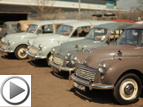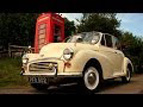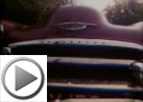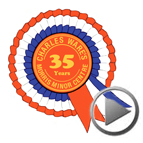Minors In Sri Lanka
An article by Bob Beavan originally published in 'Minor Monthly'
Sri Lanka, formerly Ceylon, is a small island 256 miles in depth by 148 miles across at the broadest part and is often called the 'Pearl of the East'. It is situated just off the southern tip of India. Sri Lanka gained its independence in 1948 from its former British rulers and is famous for its precious stones, tea, coconuts, modern garments and a World cup winning Cricket team.
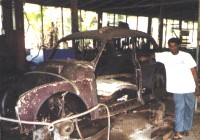 Anyone who has visited Sri Lanka will recognise the traces of British rule with ceiling fans cooling the old hotels, a road and rail network reminiscent of the 60's and above all the Morris Minor is still seen regularly on the roads.
Anyone who has visited Sri Lanka will recognise the traces of British rule with ceiling fans cooling the old hotels, a road and rail network reminiscent of the 60's and above all the Morris Minor is still seen regularly on the roads.
I recently took part in the John O'Groats to Lands End Endurance run for which I sought sponsorship for the Paynter Homes, a childrens orphanage in Nuwara Eliya which is some 6,800 feet above sea level in the centre of Sri Lanka. At the end of August, with my wife Lynne, I went back to Sri Lanka to take the money raised during the JOGLE run to the homes.
We landed in Sri Lanka at Colombo Airport after a 10½-hour flight where we met an old colleague of mine, Bernard Kumarasinghe, who would act as our guide over the next week. I had kept in touch with Bernard from my VSO days in Sri Lanka as he had studied in the early Seventies in England at the Northamptonshire College of Agriculture.
He knew of the family's attachment to Morris Minors and one of the aims of the trip was to visit the Charles Ware Sri Lankan operation in the south of the Island, as well as to photograph as many interesting moggies as possible.
The journey from Colombo to Kandy, the old hill capital, where I worked as a VSO, is some 72 miles, and the journey was interrupted on many occasions with our driver Amal stopping whenever a Morris Minor appeared at the side of the road. The journey took over three hours spotting 15 Minors on the road and numerous ones either rusting in peace or awaiting restoration. The Sri Lankan history with regard to motor vehicles is rather interesting as from the early sixties to the early eighties the government banned the import of new vehicles unless they were for agricultural use. This meant the early, pre-sixties cars had to be maintained to the highest standard. At this time the vehicles on the road were 99% British. I can remember as a VSO we had on the farm either a 1950's Ford Popular or white Mini Moke, which had been presented to the farm by a round table in Devon. The Mini Moke was used to carry churns of milk in the back to sell on the doorstep. The milk was poured from a pint jug and then at the end of the day taken to the Ceylon Milk Marketing Board. The Moke was also used to carry grass to the cows when there was not enough on our own farm in the drought times of the year. There are far more Morris minors per mile on the road than in the UK. Also one sees Austin Cambridges, Oxfords, Wolseleys, Ford Anglias and a whole range of the Rootes range of vehicles. However, the Morris Minor is undoubtedly the most popular.
The Sri Lankans ability with their hand is second to none, and during the period of no vehicle imports, accident damage or repairs would often be completed by fabricating or making replacement parts. This continues today.
The majority of Minors exported to Sri Lanka were to start with 2-door black saloons, followed by the 4-door version which became the accepted form of taxi transport for many years. The black and yellow Minor cabs can also be seen in Colombo. In the rural areas the Morris Minor is still used regularly and even modified! The Travellers found on the Island were predominantly imported for the tea planters who ran plantations at high altitude. We even found one saloon being used as a driving school car.
Cars are not only used in Sri Lanka to transport people but also goods, and the small boot space is admirably covered out by having the compulsory large roof-rack. One might feel that this would adversely effect fuel consumption but with petrol at 45p per litre and diesel at 15p a litre they certainly don't have to put up with UK fuel prices!
From Kandy we travelled some 42 miles from 2,000 feet to 6,800 feet above sea level, taking us from temperatures in the high 80's to the lower 50's, eventually arriving in Nuwara Eliya which is known as Little England. It felt like it; the monsoon rains had broken and the weather was appalling when we arrived at the Paynter Homes to present them with the cheque we had raised during the JOGLE run. It was here at the orphanage that I had also spent some time as an agricultural VSO and had promised to raise funds for them.
The total Alex, my son and I had raised by the time of our visit was £4,463.87, which enabled me to hand over to Mrs Sue Boulton, the treasurer of the homes a cheque for 511,687 rupees. Our final target of half a million rupees had been reached. They were absolutely thrilled, as I had indicated that we were aiming for £2,000 appropriate for the millennium year. As so much was raised, 250,000 rupees will be used on the farm, the balance being used to refurbish the kitchen and dining room for the children, after each child has been bought a new pair of shoes. It was an emotional occasion presenting the money, as this amount would effectively run the Homes in their entirety for over six months.
Following our departure from Nuwara Eliya we set off towards the south coast where gradually the temperatures rose; jumpers were removed, the sun came out and it was 80 degrees plus. When we arrived on the coast we travelled west passing through Matara and after a venison and wild boar curry we reached the outskirts of Galle City. Our driver Amal pulled in to the side of the road and asked for directions from the locals on how to find the Morris Minor factory. We followed the directions and arrived in Bataduwa where we came across the Morris Minor Durable Car Company.
This is run by the Charles Ware Morris Minor Centre in Bath in conjunction with the Sri Lankans. It was Sunday when we arrived but the operation was open as they were packing up a crate of Minor parts for export to Bath the following week. We were welcomed by Mr Somasiri, the foreman, who then gave us a tour. He showed us the car used for the templates and measurements for the production of all the parts they make. 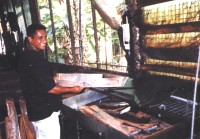 The panels are all made from finest grade steel sheets. The chassis sections, contrary to the 'knockers' in the UK of foreign parts, are produced from a more than substantial thickness of steel. We were shown the press made from a bulldozer ram that pressed and punched out most of the panels which are then, following an individual quality control check, painted and put into plastic sleeves for transportation. This enterprise is a joint initiative that is working well. The individuals were delighted to show us round and to see the new panels they have just produced for the Charles Ware Operation to test in the UK as to their suitability. The new panels we saw were for commercial vehicles and were the cab rear section lower, the cab rear section upper, together with a full length chassis leg. This is currently not available in the UK off the shelf, as I have tried to obtain one for a pick-up I am currently renovating. A much required part and service is being provided to keep Minors on the road.
The panels are all made from finest grade steel sheets. The chassis sections, contrary to the 'knockers' in the UK of foreign parts, are produced from a more than substantial thickness of steel. We were shown the press made from a bulldozer ram that pressed and punched out most of the panels which are then, following an individual quality control check, painted and put into plastic sleeves for transportation. This enterprise is a joint initiative that is working well. The individuals were delighted to show us round and to see the new panels they have just produced for the Charles Ware Operation to test in the UK as to their suitability. The new panels we saw were for commercial vehicles and were the cab rear section lower, the cab rear section upper, together with a full length chassis leg. This is currently not available in the UK off the shelf, as I have tried to obtain one for a pick-up I am currently renovating. A much required part and service is being provided to keep Minors on the road.
One might say that producing panels in a third world country such as Sri Lanka is abusing cheap available labour. Well these guys are craftsmen and on a significantly better wage than the locals. They are proud of their achievement and are delighted to be supplying the UK. 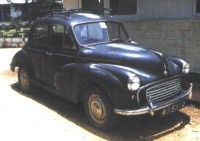 They love the link with England and the Morris Minor. In the workshops they were repairing a Traveller and it was going to cost less than £1,000 to totally refurbish and put back on the road. Whilst there we took several photographs and presented Mr Somasiri with a Minor Monthly T-shirt - he was delighted! We then departed to have a few days on the beach.
They love the link with England and the Morris Minor. In the workshops they were repairing a Traveller and it was going to cost less than £1,000 to totally refurbish and put back on the road. Whilst there we took several photographs and presented Mr Somasiri with a Minor Monthly T-shirt - he was delighted! We then departed to have a few days on the beach.
Finally I would like to thank all the Shropshire Branch Members who are continuing to raise funds for the Paynter Homes and to those involved in the Morris Minor business that helped sponsor my JOGLE run in June. It was greatly appreciated by all in the homes. So, any of you out there who are in the process of renovating a Morris Minor don't disregard the Sri Lanka panels. They are excellent, and I am sure Charlie Ware will be delighted to speak to you. Next time you are looking to take a holiday abroad, try Sri Lanka, you will love every minute of this marvellous island, as well as spotting the odd Moggie!
BOB BEAVAN
(This article was originally published in "Minor Monthly")

 Sri Lanka
Sri Lanka

